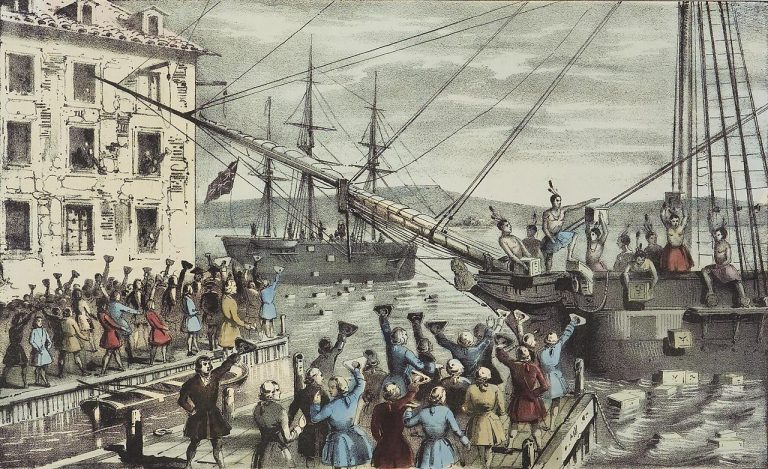
This bold action, which would come to be known as the Boston Tea Party, was a clear message to the British Crown: the American colonies would no longer tolerate “taxation without representation.”
Boston, Mass. The Boston Tea Party of 1773 stands as a pivotal moment in American history, embodying the spirit of resistance and the seeds of revolution. As I reflect on this iconic event, we’re struck by its enduring significance and the lessons it offers for global citizenship and leadership today.
On the night of December 16, 1773, a group of colonists, some disguised as Mohawk Indians, boarded three British ships anchored in Boston Harbor. In an act of defiance against British taxation policies, particularly the Tea Act of 1773, they dumped 342 chests of tea into the water. This bold action, which would come to be known as the Boston Tea Party, was a clear message to the British Crown: the American colonies would no longer tolerate “taxation without representation.”
The event was the culmination of growing tensions between the colonies and Great Britain. The Tea Act had granted the British East India Company a monopoly on tea sales in the colonies, undercutting local merchants and reinforcing the principle of Parliament’s right to tax the colonies. The Sons of Liberty, a secret organization of American patriots, saw this as an opportunity to challenge British authority[2].
The participants in the Boston Tea Party came from diverse backgrounds, including merchants, artisans, and laborers. They were united by a common cause – the desire for fair representation and economic autonomy. Their actions were not just about tea; they were a statement against oppression and a call for self-governance.
As I consider the legacy of the Boston Tea Party, I’m reminded of the power of collective action and the importance of standing up for one’s beliefs. These colonists risked severe punishment, including charges of treason, to defend their principles. Their courage and conviction set the stage for the American Revolution and the birth of a new nation.
The Boston Tea Party also demonstrates the far-reaching consequences of local actions. What began as a dispute over tea taxation in Boston Harbor reverberated across the colonies and ultimately changed the course of global history. It’s a powerful reminder that seemingly small acts of resistance can spark monumental change.
In today’s interconnected world, the lessons of the Boston Tea Party are more relevant than ever. As global citizens, we’re called to be aware of injustices, not just in our immediate surroundings but across the globe. We must be willing to challenge unfair systems and stand up for the rights of all people, regardless of nationality or background.
The event also underscores the importance of peaceful protest and civil disobedience as tools for social change. While the destruction of property was involved, the Boston Tea Party was ultimately a non-violent demonstration. It shows that effective resistance doesn’t necessarily require violence, but rather creativity, organization, and unwavering commitment to a cause.
Leadership, as exemplified by the organizers of the Boston Tea Party, involves taking calculated risks for the greater good. It requires the ability to mobilize people around a shared vision and the courage to act in the face of adversity. These are qualities that remain essential for leaders addressing global challenges today.
The Boston Tea Party also highlights the complex nature of global trade and its impact on local communities. The tea in question was from China, shipped by a British company, to be sold in the American colonies. This intricate web of international commerce mirrors our modern globalized economy, reminding us of the need for fair trade practices and economic justice on a global scale.
As we face contemporary issues like climate change, income inequality, and threats to democracy, the spirit of the Boston Tea Party can serve as an inspiration. It reminds us that ordinary people have the power to effect extraordinary change when they unite behind a common cause.
The event’s legacy extends beyond American shores. It has inspired countless movements for freedom and self-determination around the world. From India’s independence movement to the fall of the Berlin Wall, the echoes of the Boston Tea Party can be heard in struggles for liberty and justice globally.
In reflecting on this historic event, I’m reminded of the responsibility we all share as global citizens. We must remain vigilant against injustice, be willing to stand up for our principles, and work towards a more equitable world. The Boston Tea Party shows us that change is possible, even in the face of seemingly insurmountable odds.
As we navigate the complexities of our modern world, let’s carry forward the spirit of the Boston Tea Party – the spirit of courage, unity, and unwavering commitment to justice. In doing so, we honor the legacy of those brave colonists and contribute to the ongoing struggle for a more just and equitable global society.
Tea and Liberty: Lessons in Global Citizenship from the Boston Harbor (July 15, 2014)
#BostonTeaParty #AmericanRevolution #GlobalCitizenship
TAGS: Jim Luce, New York, American History, Revolution, Protest, Leadership, Global Citizenship